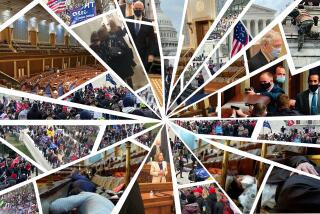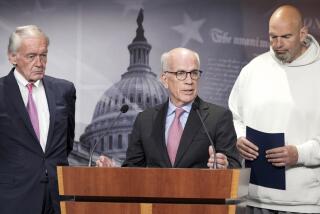Spurning the spotlight, Burris settles into the Senate
- Share via
WASHINGTON — Sen. Roland Burris was moving fast through the Capitol.
No matter that he was going in the wrong direction, headed toward the House when he thought he was going to his Senate office. His pace was brisk, his smile broad. He was having fun in his new job as the junior senator from Illinois.
Tourists, staffers, Capitol police officers, custodians and even other members of Congress all want to meet the Democrat, shake his hand and congratulate him on his arrival in Washington.
Asked if he ever felt a sense of amazement that a small-town boy from Centralia, Ill., the son of a railroad worker, would be walking through halls that are part of the nation’s history, Burris, 71, paused.
“I have had one of the most interesting lives of anyone who has ever lived,” he said, attributing his rise to the fact that “I strategize a lot, and I pray a lot.”
Without a doubt, his life just got a lot more interesting.
He has cast 27 votes since being sworn in Jan. 15. He has attended the first meetings of his three committees: armed services, homeland security and veterans affairs. And he has spoken for a total of one minute and 18 seconds about his concern for homeless veterans in urban areas during his brief appearance at the veterans panel.
Because he’s so new, it’s impossible to say that any of Burris’ workdays are typical. But one recent morning he arrived at his Senate office in the Dirksen building at 8:30, only to discover that he had beaten the band of volunteers who have been helping him.
Fortunately, he had a key.
What he does not have -- at least not at the moment -- is a number of staff aides, including a legislative director, a communications director, a scheduler, a legislative counsel or support staff. The aide who has been assigned to accompany Burris from committee hearings to the Senate floor and over to the House and back has worked as a fundraiser, but she doesn’t know her way around the Capitol, contributing to Burris’ directional missteps.
He has gotten help setting up his operation from his law partner, Fred Lebed, and his friend Jason Erkes, president of the Chicago Sport and Social Club. Rep. Bobby L. Rush (D-Ill.) has given him advice. On Friday, Burris snagged Darrel Thompson, senior advisor to Senate Majority Leader Harry Reid (D-Nev.), to be his chief of staff, though the assignment is considered temporary.
Although his path to the Senate may have been unorthodox, it certainly resulted in a massive amount of attention.
First, Burris had to fight for his seat. When he showed up to be sworn in Jan. 13, he was barred from the Capitol and gave a news conference across the street in the rain.
That cold reception was linked to the man who appointed Burris: former Illinois Gov. Rod R. Blagojevich, who was impeached by the state House, convicted unanimously by the state Senate, removed from the governorship and barred from holding future public office. Blagojevich also faces federal corruption charges, which includes an allegation that he tried to sell the Senate seat vacated by Barack Obama. Although Burris is not accused of wrongdoing, U.S. senators initially were determined not to seat anyone appointed by Blagojevich.
They backed down; Burris was sworn in two days later. And the publicity has contributed to the reaction he’s getting now.
“We’re getting calls from all over the country,” Burris said. “I would assume some of those would be African American calls, because I’m the only African American senator, and these people now know that I’m here because of all the publicity that [the media] . . . brought upon me in getting here.”
He is the fourth black senator to serve since Reconstruction, and the third to represent Illinois. He thought he would just be a low-profile, hard-working public servant. But he discovered that when you are appointed by a discredited governor and you have to fight to claim your seat, that’s not likely to be the case.
“For some reason, any time a senator comes from Illinois, they end up being a national, instant star. I mean, Carol Moseley Braun was an instant star. Barack was,” he said. “You all, you media almost turned me into one, though I had no intentions of being one.”
Although his committee assignments dictate that his focus will be on military, veterans and domestic security issues, Burris said his primary concern is the economy.
“My passion right now is jobs, jobs, jobs. We’ve got to put people back to work in this country,” he said. “That’s the only thing that’s going to do it. I’m not talking about no $5 jobs.”
He wants to see manufacturing make a comeback in America, though he acknowledged that was a tall order.
“Bring it back from all of these countries where this global economy has shipped these jobs off to,” Burris said. “I don’t know how effective that’s going to be because it’s so to the point now where you don’t know whether you can reverse it.”
At the end of a long day of votes, committee meetings and finding his way around, Burris admitted that he was feeling “tired as hell.” He asked an aide for water and grape juice. She brought back a bottle of water and a bottle of green tea.
“I don’t drink tea at all. Don’t drink tea, don’t drink coffee, don’t drink pop, OK, you learning me, OK,” he said to the staffer. “That’s why I’m still alive today.”
Asked what he wanted voters to know about him, it quickly became clear that Burris is infuriated by the public portrait that has been painted.
“What people should know about me is: I do not have horns. I have done nothing illegal or immoral or improper. I am dedicated to the service of Illinois. That’s all I want to do. I want to be a public servant,” Burris said.
The notion that he is some sort of egomaniac gnaws at him. It pains him that the press has been making fun of him, laughing at the mausoleum that bears his name, his achievements and “trail blazer” in capital letters.
“I’m an estate planner. I try to convince people to plan for your pre-needs,” he explained. “It’s best to have your crypts or your mausoleum already set aside. It takes a major burden off of your family.”
As for his list of accomplishments chiseled in granite, Burris said, “that wasn’t me.”
“The cemetery in Oak Woods insisted when I went out to plan my estate, that my resume be put on it. That wasn’t me. That was the manager of the funeral home,” he said. “They insisted that my resume be put up, and they came up with that design and did all that.”
What swayed him to set up the mausoleum, he said, was that Harold Washington, the first black mayor of Chicago, was buried at the same cemetery -- and that he had not been able to afford the burial he deserved.
“The manager of the cemetery said, ‘Mr. Burris, your accomplishments are too many to let them not be known to young people.’ And he convinced my wife and I that that’s what should be done,” Burris said. “I questioned it, and my wife questioned it, and we knew there would be that type of reaction, but we said we would be willing to overcome the cynicism of the press in order to let it be known for future generations.”
Any suggestion that space was left in case Burris won another political office is just not true, he said, adding that the media are “just dreaming up stuff” and “people are laughing at me.”
“I had nothing to do with who designed that or who left a space at the top, that’s how they put the words in,” Burris said.
“I have been silent about it. But I think it’s really unfair how they treated that situation without any knowledge,” he said. “The press just took it, ran with it and laughed about it. Talked about what my ego is, and this is just all about my business.
“If I’m going to teach you how to take care of your estate, how can I teach you or instruct you if I don’t take care of my own?” he said. “That is my business.”
--
More to Read
Get the L.A. Times Politics newsletter
Deeply reported insights into legislation, politics and policy from Sacramento, Washington and beyond. In your inbox three times per week.
You may occasionally receive promotional content from the Los Angeles Times.










